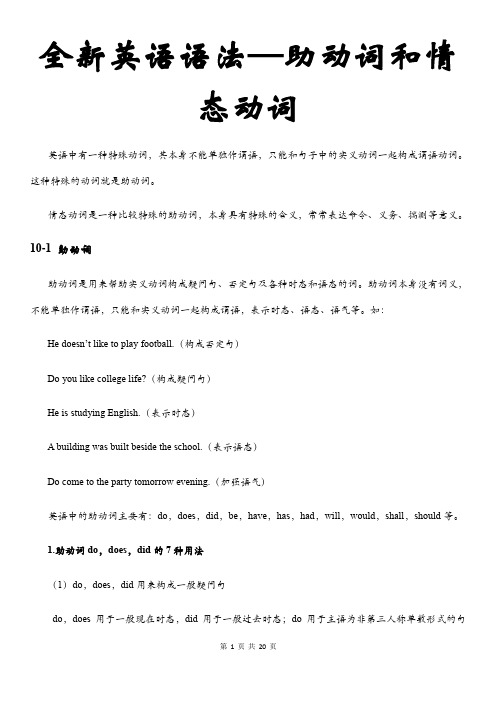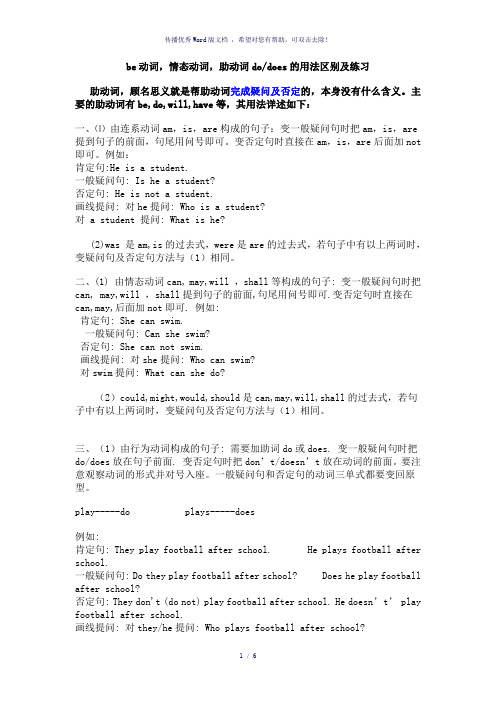(完整版)英语助动词和情态动词及练习
- 格式:doc
- 大小:154.51 KB
- 文档页数:16

动词加ing 的变化规则直接加ing cook-cooking swing-swinging eat-ea ng draw-drawing 以不发音的e 结尾,去e 加ing dance dance——dancing make-making, write —wri ng ride ride——riding have have——having skate skate——ska ng have-having take-taking hike-hiking 双写末尾的辅音字母run-ru nning swim-swi mming get-ge tting shop shop——sho pping动词+s 的变化规则 直接加-s cook→cooks, look→looks, like→likes以o. s. x. sh. ch.结尾,加-es do→does, go go→→goes watch→watches, wash→washes 以“辅音字母+y”结尾,变y 为i, 再加-es study→studies fly→flies 元音字母(a i e o u) +y 结尾,则直接加s: buy→buys play→plays say→says 特殊:have----has He has a small nose. 动词末尾加-ed cook-cooked ,cleaned, washed, listened, looked, played 结尾是e 加d taste-tasted, loved, used, liked 双写末尾的辅音字母 stop-stopped plan--planned 以“辅音字母+y”结尾的,变y 为i , 再加-ed study-studied worry---worried 词义词义 原形原形 过去式过去式 词义词义 原形原形 过去式过去式 是 am, is (be) was 走 go went 是 are (be) were 有 have, has had 买 buy bought 受伤受伤 hurt hurt 来 come came 制造制造 make made 做 do, does did 唱歌唱歌 sing sang 画 draw drew 睡觉睡觉 sleep slept 吃 eat ate 跑 run ran 感觉感觉 feel felt 说 say said 飞 fly flew 看见看见 see saw 读read read 听到听到hear heard 四、be 动词和行为动词的用法区别1.Be动词包括:is, am, are, was, were 2.实义动词:某个实际做出来的动作词语,如:swim, wash, do, go, buy, fly, sleep等等。

全新英语语法—助动词和情态动词英语中有一种特殊动词,其本身不能单独作谓语,只能和句子中的实义动词一起构成谓语动词。
这种特殊的动词就是助动词。
情态动词是一种比较特殊的助动词,本身具有特殊的含义,常常表达命令、义务、揣测等意义。
10-1 助动词助动词是用来帮助实义动词构成疑问句、否定句及各种时态和语态的词。
助动词本身没有词义,不能单独作谓语,只能和实义动词一起构成谓语,表示时态、语态、语气等。
如:He doesn’t like to play football.(构成否定句)Do you like college life?(构成疑问句)He is studying English.(表示时态)A building was built beside the school.(表示语态)Do come to the party tomorrow evening.(加强语气)英语中的助动词主要有:do,does,did,be,have,has,had,will,would,shall,should等。
1.助动词do,does,did的7种用法(1)do,does,did用来构成一般疑问句do,does用于一般现在时态,did用于一般过去时态;do用于主语为非第三人称单数形式的句子中,does只用于主语时第三人称单数的句子中。
如:Do you want to have a try?Does she have any good ideas?Did you study German?(2)do,does,did+not构成否定句do,does用于一般现在时态,did用于一般过去时态;do用于主语为非第三人称单数形式的句子中,does只用于主语是第三人称单数的额句子中。
如:I do not want to go there now.He doesn’t like playing the guitar.In the past,many students did you know the important of English.(3)do与not的缩写构成否定祈使句Do和not缩写Don't+动词原形,构成否定祈使句,表示“不要干某事”。

小学生英语助动词does、Be动词、情态动词的练习题目一、助动词does选择题1. --- _______ your father work in a hospital?- Yes, he _______.- No, he _______.A. Does, does, doesn'tB. Does, does, isn'tC. Do, do, doesn'tD. Do, do, isn't2. --- _______ your sister like ice cream?- Yes, she _______.- No, she _______.A. Does, does, doesn'tB. Does, does, isn'tC. Do, do, doesn'tD. Do, do, isn't3. --- _______ they watch TV every evening? - Yes, they _______.- No, they _______.A. Do, do, doesn'tB. Do, do, aren'tC. Does, does, doesn'tD. Does, does, isn't4. --- _______ you play football after school? - Yes, I _______.- No, I _______.A. Do, do, doesn'tB. Do, do, aren'tC. Does, does, doesn'tD. Does, does, isn't5. --- _______ Wendy have a pet dog?- Yes, she _______.- No, she _______.A. Does, does, doesn'tB. Does, does, isn'tC. Do, do, doesn'tD. Do, do, isn't二、Be动词填空题1. Tony _______ a student. He _______ in Grade 4.2. We _______ brothers. _______ names are John and Mike.3. She _______ a doctor. She _______ at a hospital.4. I _______ a teacher. I _______ English.5. They _______ my friends. _______ names are Tom and Sarah.三、情态动词选择题1. You _______ pack your bag before you go to school.A. mustB. canC. shouldD. would2. He _______ swim very well when he was young.A. canB. mayC. willD. could3. _______ I have a piece of cake?A. MayB. CanC. CouldD. Should4. You _______ eat vegetables for a healthy diet.A. mustB. canC. willD. have to5. She _______ play the piano when she was five years old.A. mustB. canC. couldD. should。

四元聚焦·英语——助动词类《对点练习+综合练习》第一节情态动词和虚拟语气(含解析)第一节情态动词和虚拟语气考点一:情态动词1.It is required by the rules that students ______ get grades not lo wer than 85 in any subject in order to get the scholarship.A. willB. mayC. shallD. would【解析】C句意:依照规定,学生假如想拿奖学金,任何单科成绩不得低于85分。
shall用于第三人称,在条约、规定、法令等文件中表示义务或规定,意为“应,必须”。
2.They are brothers, but they do not always agree with each other as they ______. Quarrels break out now and then.A. canB. shouldC. mayD. will【解析】B句意:他们是兄弟。
然而他们却并不像本来应该的那样总是赞成对方(的观点)。
争吵经常发生。
依照句意可知,此处应用should表示“应该,应当”。
3.According to the newlymade traffic regulation, whoever drive t hrough red light ______ be fined at least 200 dollars.A. shallB. mayC. wouldD. should【解析】A句意:依照最新颁布的道路治理条例,任何闯红灯者将被罚款最少200美元。
shall用于第三人称,在条约、规定、法令等文件中表示义务或规定。
4.—Hi, Lucy. Do you know where Linda is?—She ______ in the library. I met her there just a few minutes ago.A. shall beB. must beC. should have beenD. might have been【解析】B句意:——你好,露西。


be动词,情态动词,助动词do/does的用法区别及练习助动词,顾名思义就是帮助动词完成疑问及否定的,本身没有什么含义。
主要的助动词有be,do,will,have等,其用法详述如下:一、⑴由连系动词am,is,are构成的句子:变一般疑问句时把am,is,are 提到句子的前面,句尾用问号即可。
变否定句时直接在am,is,are后面加not 即可。
例如:肯定句:He is a student.一般疑问句: Is he a student?否定句: He is not a student.画线提问: 对he提问: Who is a student?对 a student 提问: What is he?(2)was 是am,is的过去式,were是are的过去式,若句子中有以上两词时,变疑问句及否定句方法与(1)相同。
二、(1) 由情态动词can, may,will ,shall等构成的句子: 变一般疑问句时把can, may,will ,shall提到句子的前面,句尾用问号即可.变否定句时直接在can,may,后面加not即可. 例如:肯定句: She can swim.一般疑问句: Can she swim?否定句: She can not swim.画线提问: 对she提问: Who can swim?对swim提问: What can she do?(2)could,might,would,should是can,may,will,shall的过去式,若句子中有以上两词时,变疑问句及否定句方法与(1)相同。
三、(1)由行为动词构成的句子: 需要加助词do或does. 变一般疑问句时把do/does放在句子前面. 变否定句时把don’t/doesn’t放在动词的前面。
要注意观察动词的形式并对号入座。
一般疑问句和否定句的动词三单式都要变回原型。
play-----do plays-----does例如:肯定句: They play football after school. He plays football after school.一般疑问句: Do they play football after school? Does he play football after school?否定句: They don't (do not) play football after school. He doesn’t’ play football after school.画线提问: 对they/he提问: Who plays football after school?对play football提问: What do they do after school? What does he do after school?对after school提问: When do they play football? When does he play football?(2)did是do和did的过去式,变一般疑问句时把did放在句子前面. 变否定句时把didn’t放在动词的前面, 要注意观察动词的形式并对号入座。
2019届高考英语总复习--助动词、情态动词和虚拟语气(共2套含答案)第七讲助动词、情态动词和虚拟语气助动词顺口溜巧记助动词Ⅰ 示之以范____________________________________________________原则这样运用 1.(2017•贵州适应性测试)What about Japanese? They dislike the lotus and ____________ not give it as a gift to Japanese because they regard it as the mourning flower. do 解析:考查时态和主谓一致。
结合语境可知,该句陈述的是一般常识,应用一般现在时,且主语为they,故该空用助动词do。
2.(2017•浙江卷)Without hesitation, I decided to follow them and we did had lots of fun that day.____________________ had→have解析:did加强语气,后跟动词原形。
3.She doesn’t her homework in the morning but in the evening.____________________ doesn’t后加do 解析:doesn’t为一般现在时的否定式后加动词原形。
4.This experience has been shown that traveling by train actually is the safest way of makingjourneys.____________________ 去掉been 解析:show和this experience为主动关系,故去掉助动词been。
5.My father has always go to work by bike since then.____________________ go→gone解析:由since then可知该句应用完成时,go的过去分词为gone。
助动词和情态动词助动词包括:be (is, am, are, was, were, been, being);have (has, had, having);do (does, did);shall (should), will (would)情态动词包括:can, could, (be able to);may, might;will ,would;dare, need, must (have to),ought to, shall, should" be + 动词不定式"可以表示下面几种意思:1.命令或指示。
例如:No one is to enter the room without permission.The books are not to be taken out of the reading-room.2.计划或安排。
例如:A new bridge is to be built over the river soon.The expedition is to start in a week's time.3.可能。
例如:This kind of tree is to be found in that forest.4.应该。
例如:Such people are to be criticized.5.表示后来发生的事,可以用来表示一种命运。
例如:They said good-bye, little knowing that they were never to meet again.He was to regret the decision.Note:was (were) + 不定式完成式这种结构表示“本来打算…,本来要…(而结果则没做)”。
例如:He was to have attended the meeting, but he fell ill.他本来要参加会议的,但是生病了。
情态动词与助动词一、情态动词的概念和种类情态动词具有一定的词义,没有人称和数的变化,不能单独构成的谓语,和谓语动词连用表示委婉语气,可以表示愿望、态度或推测等。
英语的情态动词有下列几种:can could may might must need dare will would used shall should二、can和could(一)表示能力表示天生或学到的能力,can表示现在的能力,could表示过去的能力。
Hold still so we can finish fixing ou.Who an prove it?He could swim across the river even in his later years.(二)表示可能性(可以,可能)表示此义的can是表示理论上的可能性,如果表示的是实际上的可能性的话,则使用could或may.Science has now provided answers to almost every question man can ask.Anybody can make mistakes.He may be very busy these days.It could be better to stay here.Can you come and see me tomorrow?(三)表示许可can表示许可时,是may在非正式场合的替代词。
Mother said we could do anything we wished.You can borrow two books at a time from the library.(四)表示推测can和could表示推测,通常用于否定句或疑问句中,通常有两种句型。
1.表示对现在或将来情况的推测,其结构是:can/ can’t/ could/ couldn’t +动词原形或beShe couldn’t make mistakes on this matter.What do you think this letter can mean?That can’t be the milkman. It’s too early.2.表示对已经发生的情况进行推测,其结构为:can/can’t/could/couldn’t+have+过去分词He couldn’t have said such a thing.Where can John have put the matches? He can’t have thrown them away.(五)can (could)与be able to的区别can表示能力时(既有某种知识和技能而能办到),可与be able to互换,但在将来时和完成时中必须用be able to;表示经过努力而成功地办到了具体的事情时,只能用be able to。
英语助动词和情态动词及练习 一、 概述 不同的时态(一般式、进形式、完成式、将来式),不同的语态(主动、被动),不同的语气(祈使、陈述、虚拟),不同的结构(肯定、否定、疑问),以及说话者本身的态度或命令、请求、愿望、可能等,所有这些都要借助于助动词和情态动词表达出来。助动词一般没有词意,不能单独作谓语动词,除非省略句中。他们只参加时态、语态、语气或否定、疑问结构。情态动词有词义,可以用来表示说话者的语气和态度。主要的助动词和情态动词如下表: 助动词 情态动词 be(am, is, are, was, were, being, been) can, could, be able to have(has, had , having) may might shall, will(should, would) shall, should, (ought to)will, would do (does, did) dare, need, must 二、助动词 助动词一般没有词意,不能单独作谓语动词。其作用在于帮助构成各种时态、语态、否定、疑问等。 1、助动词be(am, is, are, was, were, being, been)的用法 (1) be后跟现在分词构成进行时态。 Who is playing the violin?谁在拉小提琴? She was reading a book then.那时她正在读书。 (2)be后跟过去分词构成被动语态。 He was asked to do the work.有人要他干这件工作。 You are invited to attend the meetintg.有人邀请你参加会议。 (3)be 后跟不定式作谓语,有如下几种情况: ①表示计划、安排将要发生的事。 Who are we to meet?我们要见谁呀? I'm to have supper with John this afternoon.今天下午我要与约翰一起吃晚饭。 ②表示指示、命令,否定式表禁止。 You are to see the headmaster today.今天你必须去见校长。 You are not to enter the room without permission.未经允许你不能进入房间。 ③表示义务、责任等,同should。 You are to be back before 5.你得在5点钟以前回来。 What is to be done?该干什么。 ④表示可能性,与情态动词may, can同义。 Such books are to be found in any library.这种书任何图书馆都有。 Not a sound was to be heard.一点声响也没有。 ⑤表示后来发生的事,可以用来表示命运或注定 They say good-bye, little knowing that they were never to meet again.他们告别了,没想到再也不能相见了。 He was to regret the decision.他有一天会后悔做出这一决定的。 ⑥用于习语 Where am I to go? 我该向何处去? What am I to do? 我该怎么办? 2、助动词have(has, had, having)的用法 (1)助动词have可以构成完成时或完成进行时 He has been a doctor for 10 years.他当医生十年了。 This is the place I have been longing to visit.这就是我一直渴望参观的地方。 (2)和不定式构成谓语,表示客观上不得不做的事情。 We've missed the train. We'll have to wait for another one.我们己经误了火车,我们只能等下一列。 -Do we have to start work?我们得立刻工作吗? -No. We don't have to.不,不必了。 3、do(does, did) 的用法 (1)构成疑问句或否定句 How did you know about it?你是怎样知道这件事的。 He does not smoke. 他不抽烟。 (2)加强语气。 He did tell that.他的确告诉了此事。 Do come and see us.一定来看我们。 (3)代替前面刚出现的动词,避免重复。 -You like popular music, don't you?你喜欢流行音乐,是吧? -Yes , I do.是的,我喜欢。 He speaks French as fluently as she does.他讲法语和她讲的一样流利。 (4)用于倒装句中。 Never did he pay attention to my words.他从不注意我的话。 Only then did I understand the importance of English.只是那时,我才了解到英语的重要性。 (5)构成否定的祈使句。 Don't be so careless.不要那么粗心。 Do not hesitate to come for help.只管来求助。 4、shall(should)和will(would) 的用法 (1)shall(should)用于第一人称的将来时中,单纯表示来 I shall think it over.我要好好考虑一下。 When shall I see you again?我何时再见到你? I rang up to tell her that I should leave for London. 我打电话告诉她我要去伦敦。 (2)will用于第二、第三人称的将来时态中,在现代英语中可以用于所有人称 He will be 30 next month. 他下月将是30岁。 You will have an English test tomorrow.明天你有英语小测验。 He wanted to know when you would finish the writing.他想知道你何时完成写作。 三、情态动词 1、情态动词的特征 情态动词表示说话人对某一动作或状态的态度,认为“可能、应当、必要”等等,但本身意义不完全,不能单独作谓语,必须和其他动词一起构成谓语。除ought, used, have后跟不定式外,其他情态动词一律跟动词原形。情态动词主要有:can/could, may/might, must, ought to, used to, need, dare, shall/should, will/would, have to等。 2、情态动词的变化形式 (1)没有人称和数的变化。 I can /we can/ you can he can/she can/they can/it can Johnny, you mustn’t play with the knife, you may hurt yourself.约翰,你不能玩刀,那可能会伤着你。 A left luggage office is a place where bags can be left for a short time, especially at a railway station. 行李寄存处特别是在火车站短时间存放包的地方。 He ought to know her address.他该知道她的地址。 (2)大部分情态动词有过去式: can-could may-might need-needed dare-dared shall-should will-would – Is John coming by train? 约翰坐火车来吗? – He should, but he may not. He likes driving his car.应该是,他有可能不乘坐火车。他喜欢开车。 - Are you coming to Jeff's party? 你来参加Jeff的聚会吗? - I'm not sure. I might go to the concert instead. 我不敢肯定,我可能去参加音乐会。 (3)少部分情态动词没过去式或者说过去式与原形相同,used to 只有过去式形式。 must-must(had to) ought to -ought to I used to go there.我(以前)常到那里去。 You must be tired after your long journey. 你走了这么远的路,一定很累。 (4)大多数情态动词后面还可跟动词的进行时、完成时和被动式形式: can/may/must+ be doing/have done/be done should/would/might+be doing/have done/be done He must have earned a large sum of money.他一定是挣了一笔巨款。 You mustn’t always be talking so much.你不能总是说起来没完没了。 3、否定式和疑问式 情态动词的否定式和疑问式同助动词。否定式是在情态动词后加not;疑问式是将情态动词提前到主语的前面。 情态动词 否定式 简略式 can may must could might need dare shall will should would ought used can not may not must not could not might not need not dare not shall not will not should not would not ought not used not can't mayn't mustn't couldn't mightn't needn't daren't shan't won't shouldn't wouldn't oughtn't to usen't to -Will you stay for lunch? 你留下来吃午饭好吗? -Sorry, I can’t. My brother is coming to see me. 对不起,我不能(留下来吃午饭),我兄弟要来看我。 May I ask you a question?我可以问你一个问题吗? I was really anxious about you. You shouldn’t have left home without a word. 你真急死我了。你不该一句话也不说就离开家。 注意:have to 的疑问和否定是借助于do来构成。 Do you have to go out today?今天你得出去吗?